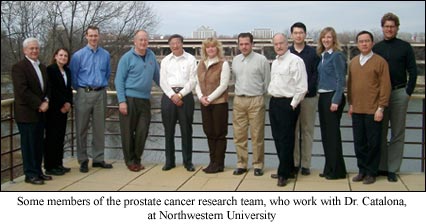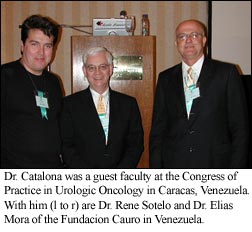My Research Projects on the Genetics of Prostate Cancer

Prostate cancer (CaP) is a complex disease involving multiple steps and pathways to the development of cancer. Each step involves one or more genetic changes.
Family studies have found varying degrees of clustering of prostate cancer in certain families, suggesting that some families have a hereditary predisposition to prostate cancer.
Genetic samples from these families are extraordinarily important in research work on prostate cancer.
While I practiced in St. Louis, I collected samples from thousands of patients and research participants needed to carry out prostate cancer genetics studies.
Now, I have begun a new collection of samples at Northwestern through the Prostate Cancer SPORE (Specialized Program of Research Excellence).
All these samples are a valuable resource for discovering the causes of prostate cancer, as well as what determines the aggressiveness of prostate cancer. We are currently recruiting patients into these studies.
My present research projects at Northwestern University in the Department of Urology or at Washington University (in collaboration with Dr. Brian Suarez) include:
- Genetics of Prostate Cancer.
- Prostate Cancer Control Study.
- PSA Follow-up Study
- SPORE Prostate Cancer Biorepository
Genetics of CaP
The purpose of the Genetics of Prostate Cancer study is to record the family histories of men who are diagnosed at an early age with prostate cancer or who have a family history of prostate cancer.
CaP Control Study
The purpose of the Prostate Cancer Control study is to study men who do not have prostate cancer to compare them to men who have prostate cancer.
PSA Follow-Up
The purpose of the PSA Follow-Up Study, for men diagnosed with prostate cancer through participation in the PSA Study, is to describe the disease course of prostate cancer, particularly the aggressiveness of prostate cancer, and to determine the effectiveness, complications, and quality of life after different treatments in men with prostate cancer that had been detected in a screening study.
CaP biorepository
The purpose of SPORE Prostate Cancer Biorepository is to obtain tumor tissues, seminal vesicle and prostatic fluid, and serum and blood samples for genetic testing. At the time of surgery, patients have a blood sample drawn and a sample of their prostate gland and its secretions removed from the surgical specimen to be tested in the research laboratory.
Progress to Date 
We have performed analyses of genetic linkage that have revealed several candidate regions associated with the diagnosis and aggressiveness of prostate cancer.
The strongest linkage signal was found on chromosome 16; this signal has now been narrowed down to a candidate region and is being narrowed further by collaborators at the Cleveland Clinic and the University of California San Francisco.
Also, we have identified two chromosomal regions associated with prostate cancer aggressiveness. One of these regions is located on chromosome 7q 32 q 33.
We have found a second region associated with prostate cancer aggressiveness on chromosome 19 q 12 q 13.11. This region contains many interesting candidate genes such as PSA hK-11 and hepsin.
This region is being further narrowed by studies being performed by our collaborator, Dr. Ranjan Deka, at the University of Cincinnati. This region was also confirmed by the Mayo Clinic group and we are currently performing a study in which we are combining the genetic data from both institutions.
We have also performed collaborative studies on a prostate cancer candidate gene on chromosome 1 called RNASEL.
In collaboration with our colleagues in Cleveland, we have shown that a variant of the RNASEL gene (R462Q) is significantly associated with prostate cancer risk in a family based case-control study.
Furthermore, at least one copy of the R462Q variant was carried by nearly 60% of the prostate cancer patients in our study. We estimate that nearly 13% of prostate cancer cases are attributable to the R462Q variant of the RNASEL gene.
We have also conducted gene expression profiling studies with collaborators at MIT/Harvard. We have determined the expression of 42,000 gene transcripts in each of approximately 50 patients who appeared to have been cured of prostate cancer and approximately 50 patients who have had recurrence of their prostate cancer.
These studies will point to molecular finger prints of prostate cancer and identify candidate genes responsible for prostate cancer aggressiveness.
We are currently conducting an extensive evaluation of single nucleotide polymorphisms (snps) (see article in Winter 2003 QUEST) in candidate regions and genes for prostate cancer susceptibility and aggressiveness with our collaborators at Marshfield Medical Research Foundation.
These studies have revealed 7 snps that are significantly associated with genes that may affect prostate cancer susceptibility or aggressiveness.
We have recently embarked on studies with our collaborator at Washington University, Dr. Jeffrey Milbrandt, on sequencing genes in DNA from our patients who have undergone expression profiling at MIT/Harvard for mutations that may be important to the development and progression of prostate cancer.
Through the Robert H. Lurie Comprehensive Cancer Center at Northwestern, Dr. Han and I have initiated a Familial Prostate Cancer Screening Program for men with a family history of prostate cancer and their relatives.
I am collaborating with researchers at Beckman Coulter Inc in studies of pro-PSA forms as markers to discriminate between prostate cancer and benign conditions in men with total PSA levels in the diagnostic gray zone of 2.5 to 10 ng/ml.
I am also collaborating with researchers at the University of Toronto in studies of hK11, a potential new marker in the PSA family for prostate cancer.
I have been collaborating with investigators at Harvard and Washington University on clinical research studies focused on lowering PSA cutoffs for recommending prostate biopsy. These studies were recently published in the New England Journal of Medicine.











